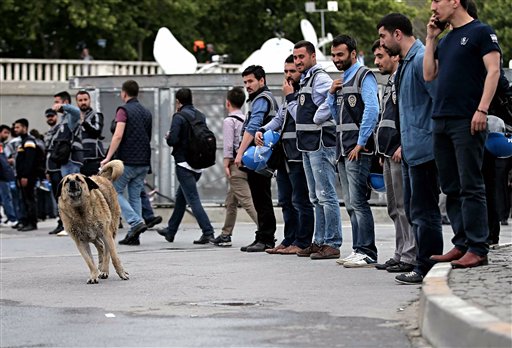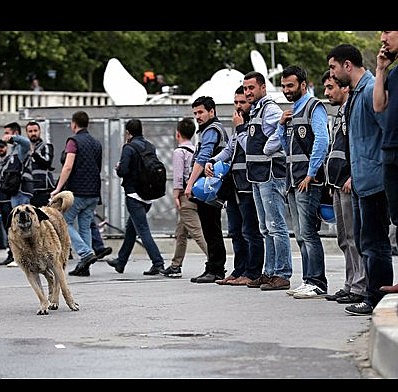 Turkish security members watch a dog run as they close the city's landmark Taksim Square and Gezi Park on the first anniversary of last year's protests in Istanbul, Turkey, on May 31, 2014. A government backed redevelopment plan for Gezi Park in Istanbul sparked anger and morphed into nationwide anti-government protests in June, leaving eight people dead and thousands other injured.
Turkish security members watch a dog run as they close the city's landmark Taksim Square and Gezi Park on the first anniversary of last year's protests in Istanbul, Turkey, on May 31, 2014. A government backed redevelopment plan for Gezi Park in Istanbul sparked anger and morphed into nationwide anti-government protests in June, leaving eight people dead and thousands other injured.ISTANBUL - Police used tear gas and water cannon on Saturday to push back crowds of protesters who defied a warning by Turkey's prime minister and gathered in Istanbul and Ankara on the anniversary of last year's nationwide anti-government demonstrations.
Riot police fired tear gas on hundreds of protesters on a main pedestrian street leading to Istanbul's main square, Taksim, following a stand-off with police. Clashes also erupted in the capital Ankara, where police used water cannons against a group of stone-throwing protesters.
Dogan new agency video footage showed police, some in plain clothes, detaining several people in the two cities. Abdulbaki Boga, of the Human Rights Association, told The Associated Press at least 83 people were detained and 14 people were injured in Istanbul alone.
Large numbers of police blocked access to Taksim, and news reports earlier said authorities planned to deploy some 25,000 police officers and up to 50 anti-riot water cannon vehicles around the city to thwart the demonstrations. Prime Minister Recep Tayyip Erdogan warned activists to keep away from the square, saying authorities were under strict orders to prevent protests.
"I am calling on my people: don't fall for this trap. This is not an innocent environmental action," Erdogan said.
In late May and June last year, hundreds of thousands of Turks took to the streets denouncing Erdogan's increasingly autocratic leadership and demanding more democratic freedoms. The protests were sparked by opposition to government plans to uproot trees at Taksim Square's Gezi Park and build a shopping center.
Fanned by outrage over the often brutal reaction by police, the demonstrations soon spread to other cities and developed into Turkey's biggest protests in decades. Thousands were wounded and at least 12 people have died in anti-government protests in the past year.
Despite the ban, hundreds of people tried to reach Taksim.
In a speech in Istanbul earlier, Erdogan said: "If you go there, our security forces are under strict orders, they will do whatever is necessary from A to Z. You won't be able to go to Gezi like the last time. You have to obey the laws. If you don't, the state will do whatever is necessary."
Ahead of the protests, CNN correspondent Ivan Watson said he was detained briefly during a live broadcast. He said that police had kneed him and that an officer later apologized.
Turkey's association of journalists condemned his detention and called the police action "shameful."
A report this week by the Paris-based International Federation for Human Rights said that more than 5,600 demonstrators were being prosecuted for involvement in the protests while no one responsible for the violence against protesters had been sentenced.
The Turkish authorities "are actively engaging in a witch hunt against those who participated in the protests or spoke out," said the federation's president, Karim Lahidji.
